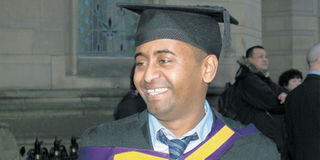With no college papers, he earned a Masters

Mr Salim Mohamed after graduating with a Masters at the University of Manchester in the United Kingdom. Photo/COURTESY
A number of his peers were lucky to further their education easily, but he was not as fortunate.
Salim Mohamed had big ambitions — secure a white-collar job and work with an international organisation.
And realising these dreams could perhaps have been easier with a sound college education.
But after failing to join a tertiary institution, the community became his college, a stepping stone to greater things.
Mohamed attended a series of courses but these were not adequate for any recognisable certification.
But despite this, Mohamed has managed consultancy projects in Kenya, Nigeria and South Africa and has even been a programme manager at Carolina For Kibera.
Meet Mohamed, 35, a portrait of hope and determination. His is a story of how a chosen few can emerge triumphant against all odds.
In a world where people with no college education are perceived to have limited opportunities, Mohamed is a testament of the possibilities life can throw up.
Most people with no college or even high school education easily give up and fail to do anything with their lives. Not Mohamed.
With a high school certificate and no undergraduate degree or diploma certificate, he enrolled for a Masters degree programme at the University of Manchester in the United Kingdom and graduated with a distinction.
“They looked at the academic papers I had written and the references; people who had talked about my work,” says Mohamed of the application process, adding his education was funded by friends.
This week, the Saturday Nation had a chat with the East Africa representative of Ashoka, a non-profit organisation that supports entrepreneurs and change makers across the world.
Two years ago, Mohamed could never have imagined landing such a prestigious position.
Having joined the university programme in December 2009, Mohamed graduated last December with a Masters degree in management and implementation of development projects.
He returned to Kenya in January this year and landed the job with Ashoka.
Prof Paul Barry, director of the Masters in Science in management and implementation of development programme at the University of Manchester told Saturday Nation: “He was a highly motivated and industrious student, a team play and a leader in the group. He was highly considerate about the wellbeing of his colleagues and contributed much to the harmony and coherence of the group. He excelled in his studies, achieving a deserved distinction.”
A close acquaintance this week described Mohamed as “awesome and talented.”
Despite his feat, Mohamed is modest, saying he owes everything to the communities he worked with which humbled and taught him values he could never have acquired at school.
He describes the community as the “school of life”.
“Sometimes, we don’t really apply what we learn in school. What you learn in life is practical. The degree is not everything; there is a lot of learning in the communities. The best school is the school of life, which is the community and what you learn and how it translates to your life,” says an unassuming Mohamed.
“You can have a degree, but practically you can be empty because all you know you have learned from books,” he adds.
An orphan, Mohamed grew up in Nairobi’s Mama Fatuma’s Children’s Home.
He was barely two when he was taken to the home. He has no clear details about his parents and only says: “That’s a story for another day.”
Mohamed says he did not make it in life because of living in a children’s home and stresses: “I am doing this because I can.”
It was not easy convincing Mohamed to be interviewed as he did not want to “attract sympathy.”
He says living among 115 other children shaped his ideals about being in a “large family”
“We never bothered what tribe or religion you were or where you came from. We saw each other as brothers and sisters,” he recalls.
At an early age, he says, he did not want his schoolmates to know he lived in a children’s home. “The first few years, I didn’t want to be identified as coming from a home. But as I grew up, I realised it was a place of privilege,” he says. “Mama Fatuma raised us as her own children.”
At the home, Mohamed joined the Mathare Youth Sports Association where he played football alongside former Harambee Stars coach Francis Kimanzi.
The young Mohamed, barely 14, was appointed chairman of the association and worked closely with Bob Munro, a man he says was one of his mentors.
When he turned 17, he left for Kibera to become programme manager at Carolina For Kibera.
“I had learned a lot about mobilising community gatherings and how to use sports as a tool of development. But when I went to Kibera, it was different from Mathare,” says Mohamed, who pays fees for three secondary school and two college students.
Today, he stands head held high for choosing to work with the community as he could have been a footballer like his contemporaries in Mathare United.
But the opportunity to join the University of Manchester is the climax of his life. He recalls his first days in the midst of students who had been to undergraduate class and had developed a reading culture as daunting.
For now, Mohamed is concentrating on mentoring young people to achieve their dreams. He encourages them “never ever to give up” even when things look bad.
“There are always alternatives in life. I took the alternative of not playing football and ended up spending a lot of time on leadership. There is need for young people to give back in terms of knowledge. Every young person is a changer maker.”




